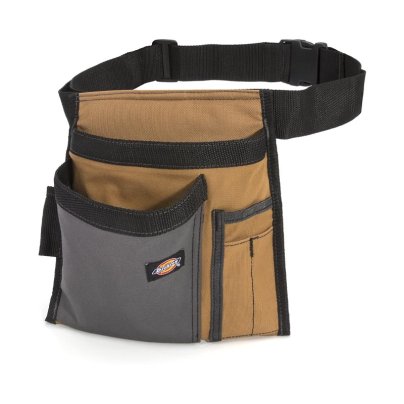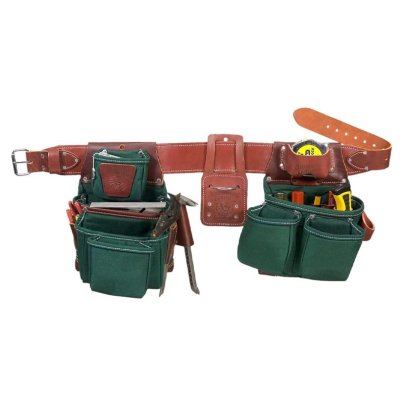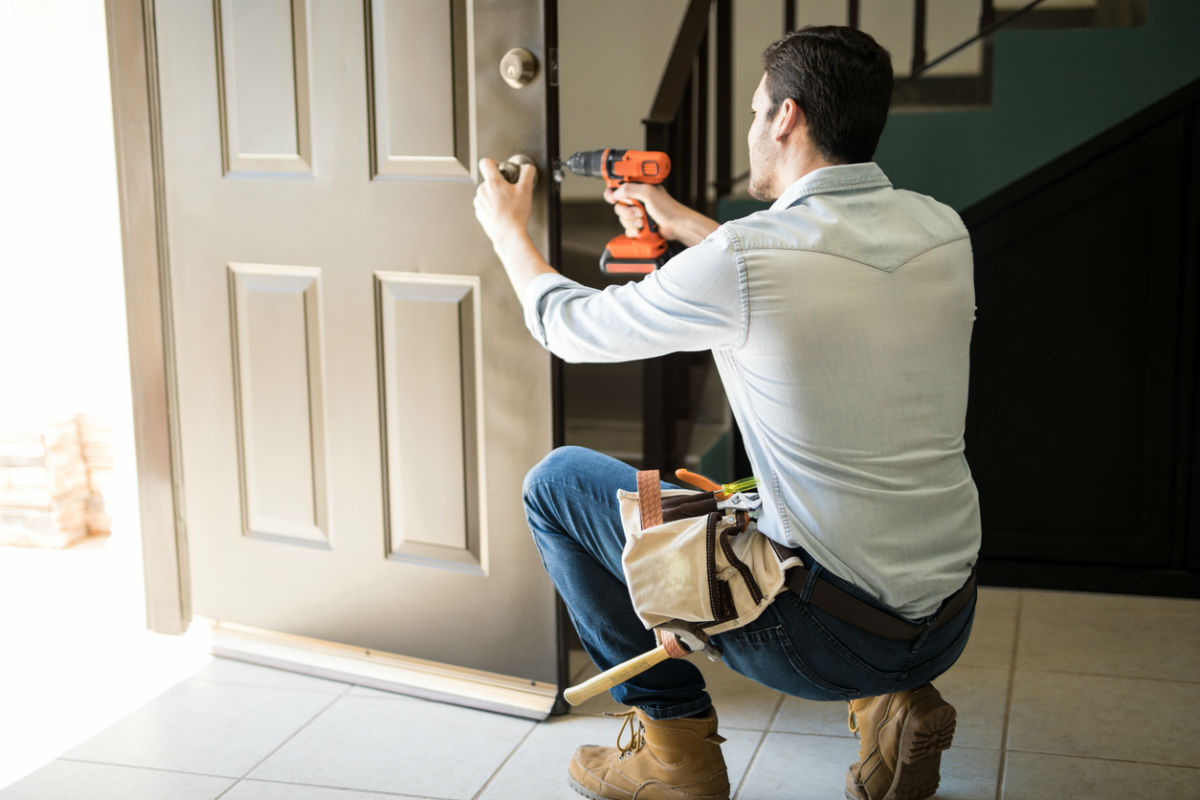
We may earn revenue from the products available on this page and participate in affiliate programs. Learn More ›
“Do” is the fun part of “do it yourself.” Time spent searching for the right hand tools, tape, and fasteners—especially halfway through a project? No fun at all. Fortunately, a well-organized tool belt keeps all your essentials hanging right off your hips. And there’s no denying that buckling one on makes even a novice DIYer feel like a swaggering pro.
Since tool belts come in various materials and designs, it’s wise to do a bit of research before buying one. Read on for must-know info and a curated list of the best tool belt options for different jobs and storage requirements.
- BEST OVERALL: DEWALT Framer’s Combo Apron with Suspenders 20 Pocket
- BEST BUDGET: Dickies 5-Pocket Single Side Tool Belt Work Apron
- UPGRADE PICK: Occidental Leather 8089 M OxyLights 7 Bag Framer Set
- BEST FOR CARPENTERS: Gatorback B145 Carpenters Triple Combo Work Belt
- BEST FOR ELECTRICIANS: Gatorback B240 Electrician’s Combo Heavy Duty Belt
- BEST FOR GARDENING: Geboor Gardening Tool Belt Heavy Duty Oxford Apron
- BEST SMALL: Custom Leathercraft Suede Tool Belt, 3 Pocket
- BEST HIGH-CAPACITY: Bucket Boss 3 Bag Tool Belt with Suspenders 55135
- BEST WITH SUSPENSION RIG: Milwaukee General Contractor Work Belt
- BEST TOOL BELT SET: ToughBuilt Handyman Tool Belt Set
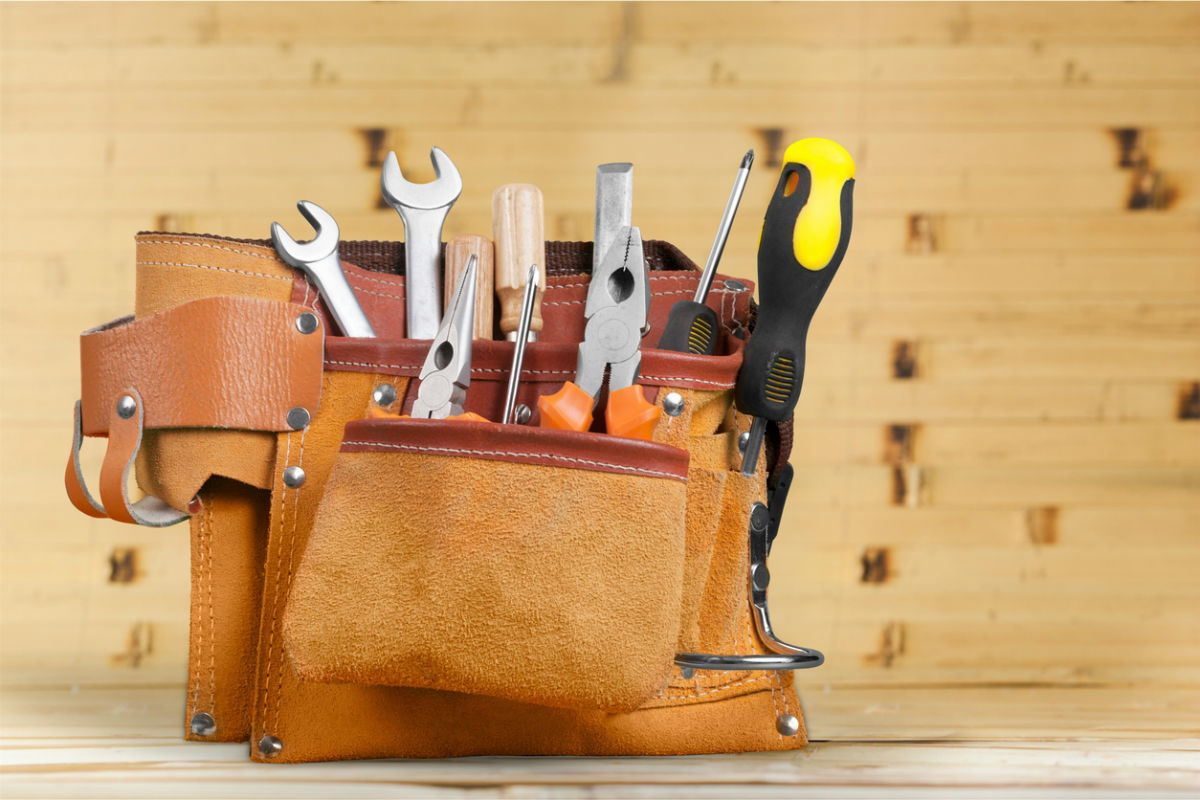
Common Tool Belt Features
The right tool belt should feel like an extra hand in the workshop. They keep essential tools right where you need them and save the time and effort of constant trips to a tool box or bag. General purpose models work great for DIYers, while more specialized designs, such as the carpenters tool belt, focus on specific trades. Understanding the available features is an important step in choosing the best tool belt for you.
Suspender
Many DIY and garden tool belts hold just a few essential tools for household and yard chores. That keeps these belts relatively light even when fully loaded. Larger belts, on the other hand, easily carry 40 to 50 pounds of tools. While all those tools give DIYers more options, the weight may lead to back pain.
A suspender, also known as a shoulder harness, solves this weight problem. Tool suspenders hook onto a belt and spread the load across the back and shoulders. Attachments to hold the tools are either plastic or metal; we favor the latter for greater durability.
Wide straps with good padding will help ensure that the apparatus doesn’t just shift pain and discomfort elsewhere on your body. A chest strap helps hold the suspender in place. Although suspenders maximize comfort, they may make it difficult to move in confined spaces, so pay attention to their overall size and bulk before you buy.
Waist and Hip
If a tool belt doesn’t have a suspender, your waist and hips will have to support its weight. DIYers who don’t plan to wear a tool belt all day may have no problem with this style.
Nevertheless, you should still consider belt materials, widths, and padding. Lightweight tool belts, for example, often come in the form of a plain polyester belt with a quick-detach plastic fitting. Fine for short-term use, they may rub uncomfortably over loose or thin clothing, especially after prolonged periods of use. For the sake of comparison, the best electrician tool belt we found features a particularly deep and well-padded rear section for added comfort and lumbar support.
Pouches and Pockets
The number and size of pouches that come in a tool belt vary widely. The best choice for any DIYer depends greatly on the tasks at hand.
Pouches and pockets should have strong edges and seams. Double stitching and rivets may help in that department. Look for stiff pockets with reinforced corners. In the best tool belt for framing or roofing, you’ll also need puncture-resistant pouches to withstand nail points.
The manner in which pouches and pockets attach factors in as well. Pockets sewn directly to the belt work OK to hold a few tools, but they won’t support a heavy load. Hook-and-loop or clip fastenings, on the other hand, hold more weight and allow users to move the pockets and pouches around on the belt to suit different activities.
Apron
When it comes to tool belts, the term “apron” can be misleading. Few offer much protection for clothing underneath. The term may simply indicate that all of the pockets are part of a single garment, which forms an apron of sorts. It may also mean that a number of different pouches or tool holders hang down at the front of the body.
Just to add to the confusion, we found one model called a combo apron tool belt, which includes a suspender! Some tool belts called aprons feature movable pouches. Focus on construction and capacity, not the name.
What to Consider When Choosing the Best Tool Belt
Now it’s time to check out the factors that figure into durability, wearability, and suitability for a range of tasks. Taken together, these considerations will help you choose the best tool belt for your needs.
Material
Commonly made of different material types, some tool belts are more rugged than others:
- Oiled leather and suede figure prominently into the components of a traditional tool belt. Both the sturdiest and the heaviest materials, they come with a lot of advantages. Pointed tools such as screwdrivers and chisels won’t poke through this material, which lasts decades with proper care. Just keep in mind that leather degrades if it’s often wet.
- Polyester, nylon, or other synthetic materials make for a good belt for the casual or infrequent DIYer who wants to carry a few basic tools. These materials don’t stand up to heavy or pointed tools as effectively as leather tool belts do.
- Heavy cotton canvas, polyester, nylon, or “pleather” often hits the sweet spot between the weight of oiled leather and the reduced durability of lightweight synthetics. A sturdy faux leather or polyester tool belt makes a good choice for typical homeowners or DIYers.
Size and Weight
Tool belts frequently come in sizes that align with waist measurements. Or, you may see the more generic designations of “small,” “medium,” and “large.” Choose a tool belt that would fit comfortably around your waist—not too tight or too loose. If you are unsure of your size, go for an adjustable tool belt.
The tasks you need to perform will have a bearing on the weight the tool belt needs to support. Large belts with suspenders can be an efficient means of storing frequently used tools, though care should be taken not to overload the belt, which can cause discomfort.
Portability
Some tool belts pack fewer than five pockets, while others may feature more than 30 along with other means to carry essentials. A basic belt with five or six open pockets might be fine if all you need is a hammer, screwdriver, and a box of nails. On the other hand, if your belt takes the place of a trusty tool box, you’ll want something more versatile, with open pockets of varying sizes, zippered pouches, hanging loops, and clips that let you keep your go-to tools organized right where you want them.
Special Features
- General layout of pouches or pockets is key. The best configuration depends on the type of work you plan to do. Take the time to consider what you’ll need to carry in your belt and where on your body you’d like it to be.
- Hanging loops commonly accommodate hammers or drills. People often complain that loops are too small or snag on the hammer handle. Make sure the loops on your belt fit your needs.
- Quick-release buckles are convenient, as you’ll want to remove the belt at some point in your work day. This feature is especially important with suspenders.
- Clips and buckles come in plastic or metal. The former weighs less and works fine. The latter, while heavier, will last longer.
- A phone pocket makes a useful addition. You’re more likely to find this on suspenders, where phones stay tucked out of the way of other tools.
Our Top Picks
The following tool belts rank among the best in their class. With your particular shopping considerations in mind, read on to find the right tool organization belt for your work or DIY needs.
Best Overall
DEWALT Framer's Combo Apron with Suspenders 20 Pocket
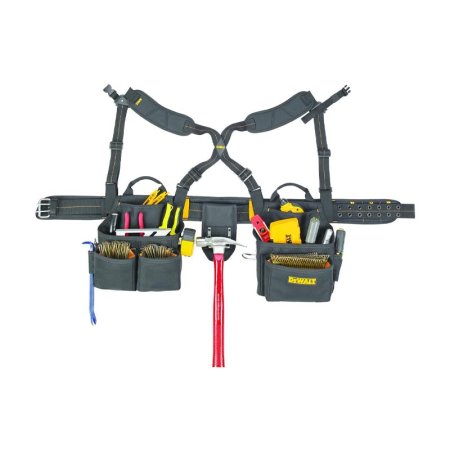
Pros
Cons
Product Specs
- Material: Polyester
- Pockets/pouches: 20
- Waist adjustment: 29 inches to 46 inches
With its comfortable design, numerous pockets for organization, and sturdy construction, this framer’s tool belt from DeWalt, one of the top tool manufacturers in the business, makes a fine pick. Organization is crucial for a functional tool belt, and this model doesn’t disappoint.
This belt boasts 20 pockets, including seven main pockets for pliers, squares, clamps, and other hand tools. Numerous smaller pockets and sleeves make room for nails, pencils, and miscellaneous hardware. A separate zipper pouch stores valuables, such as keys, while a metal front clip holds a hammer.
With suspenders and a belt that feature dense padding for the shoulders and hips, this belt won’t shift or create uncomfortable pressure points as the day wears on. A wide adjustment range on the suspenders and a belt that fits waists from 29 to 46 inches make this a suitable choice for a variety of body sizes.
Best Budget
Dickies 5-Pocket Single Side Tool Belt Work Apron

Pros
Cons
Product Specs
- Material: Canvas and polyester
- Pockets/pouches: 5
- Waist adjustment: 32 inches to 52 inches
With five pockets, Dickies’ tool belt provides ample space for a hammer, screwdriver, pliers, tape measure, and perhaps a few nails. Its single-side design lets wearers move freely without pockets banging against their thighs. Workers may wear it apron-style with the pockets at the front, or twist it around to buckle it at the front or side and change the location of the fixed pockets.
Constructed of heavyweight canvas, this belt stands up to rugged use. Pockets reinforced with webbing provide extra durability. This apron tool belt should see DIYers through simple fix-it projects for many years. It adjusts to fit waists from 32 to 52 inches.
Upgrade Pick
Occidental Leather 8089 M OxyLights 7 Bag Framer Set
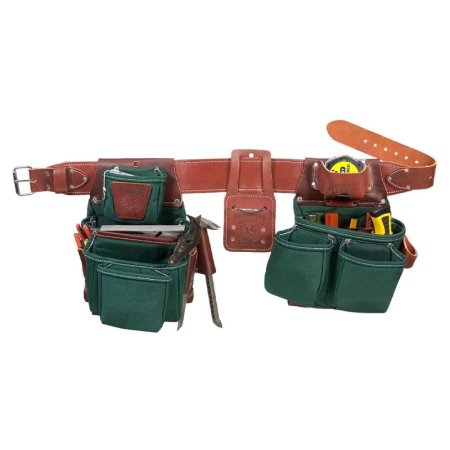
Pros
Cons
Product Specs
- Material: Leather and nylon
- Pockets/pouches: 7
- Waist adjustment: Four sizes from 34 inches to 45 inches
When it comes to durability, nothing matches the toughness of genuine leather. With its all-leather construction, this Occidental Leather tool belt will perform through many years and many projects. While other materials wear with age, leather becomes softer and more supple, conforming to the user’s hips.
That’s not to say the pockets won’t hold their shape. The molded external pockets stay wide open, allowing workers to get their hands inside to fish out fasteners. One pocket serves as a perfect fit for a tape measure, while a leather piece with a steel clip makes an ideal hammer holder.
Three large pouches hold tools such as screwdrivers, utility knives, and other hand tools. Smaller pockets offer plenty of room for pencils and a set of pliers. Occidental Leather’s handsome tool belt comes in a light tan color with green pockets and pouches and is available in sizes from small to XL.
Best for Carpenters
Gatorback B145 Carpenters Triple Combo Work Belt
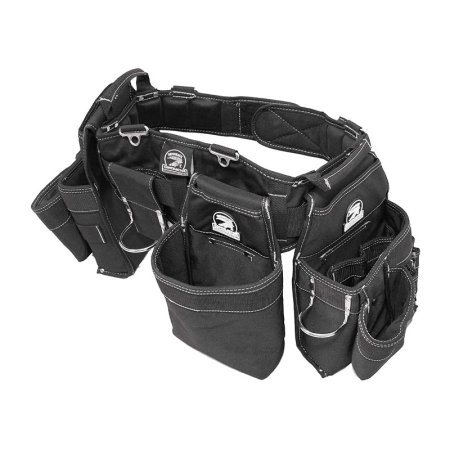
Pros
Cons
Product Specs
- Material: Heavy-duty DuraTek nylon
- Pockets/pouches: 11
- Waist adjustment: Six sizes from 26 inches to 55 inches
From its sturdy design to its thoughtful placement of varying pocket sizes, this high-quality framing tool belt is suitable for professionals and DIY carpenters alike. Heavy-duty DuraTek nylon construction, steel suspender rings, and pockets reinforced with rivets and bar-tack stitching ensure this tool belt will endure the most rugged work sites.
Gatorback’s boxed pouch design uses a plastic insert to force the pockets to stay open, which makes it easier for carpenters to get their hands into the pouches and grab what they need. Users may remove and rearrange the pouches to personalize the belt to suit any need.
Gatorback pays special attention to comfort: Its fitted belt includes memory-pad back support that fits better and feels better. The belt weighs in at 5 pounds and comes in sizes small to 3XL.
Best for Electricians
Gatorback B240 Electrician's Combo Heavy Duty Belt
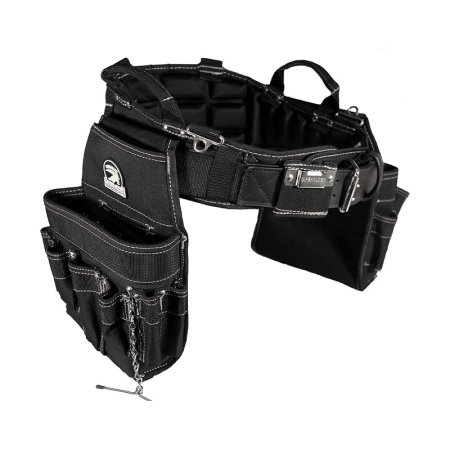
Pros
Cons
Product Specs
- Material: Heavy-duty DuraTek nylon
- Pockets/pouches: 27
- Waist adjustment: Six sizes from 26 inches to 55 inches
Gatorback’s electrician tool belt keeps workers cool with breathable air channels built into the material for comfortable and sweat-free use. A memory foam back support helps the wearer maintain good posture for fewer backaches later on.
This nylon electrician tool belt is both riveted and bar-tacked for longer-lasting durability and strength. It comes with an 18-pocket right pouch and nine-pocket left pouch to help carry a variety of tools and materials.
Plastic sewn into the material reinforces the open shape of the pockets to keep tools accessible and prevent them from piercing pocket bottoms. A double metal buckle ensures this belt stays in place.
Best for Gardening
Geboor Gardening Tool Belt Heavy Duty Oxford Apron
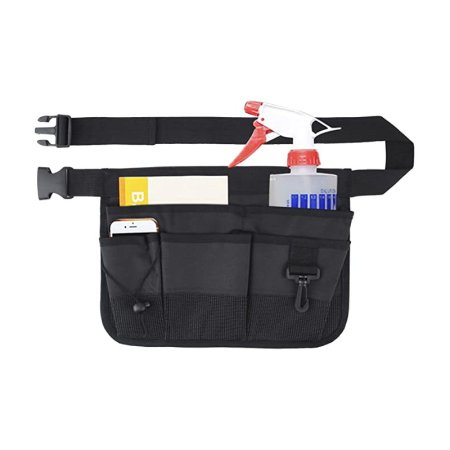
Pros
Cons
Product Specs
- Material: Oxford fabric (polyester)
- Pockets/pouches: 7
- Waist adjustment: 32 inches to 46.5 inches
Geebor’s garden tool belt works just right for those times when only a few chores remain around the garden, so there’s no need for a whole bunch of gear. Washable light oxford fabric shrugs off dirt and provides good resistance against wear and tear.
Five front pockets include a variety of sizes, a lanyard clip, and a drawstring. Two back pockets provide space for a phone, notebook, or other small, flat item. A quick-release clip makes the whole thing easy to put on and take off, and it comes in a choice of black or green.
Best Small
Custom Leathercraft Suede Tool Belt, 3 Pocket
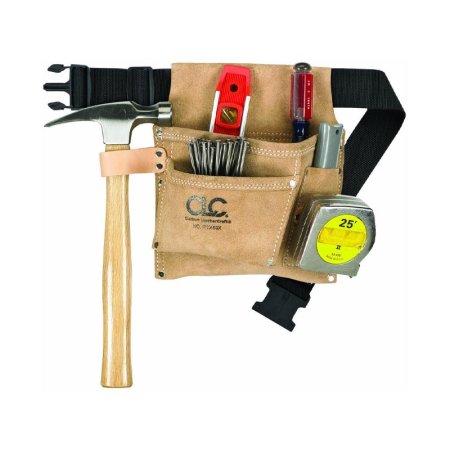
Pros
Cons
Product Specs
- Material: Suede with polyester belt
- Pockets/Pouches: 3
- Waist adjustment: 29 inches to 46 inches
DIY users and professionals don’t always need to carry around a whole tool box on their belt, often needing only a handful of tools to tackle a couple of jobs. Custom Leathercraft’s compact tool belt keeps these types of workers in mind. It features a loop for a hammer or square; two deep pockets for nails; a measuring tape clip; and a smaller pocket for a pencil, screwdriver, or other thin tools.
The belt itself comes in heavy polyester with rugged suede pockets and a quick-release buckle for easy on and off. This affordable carpenter’s tool belt fits waists from 29 to 46 inches.
Best High-Capacity
Bucket Boss 3 Bag Tool Belt with Suspenders 55135
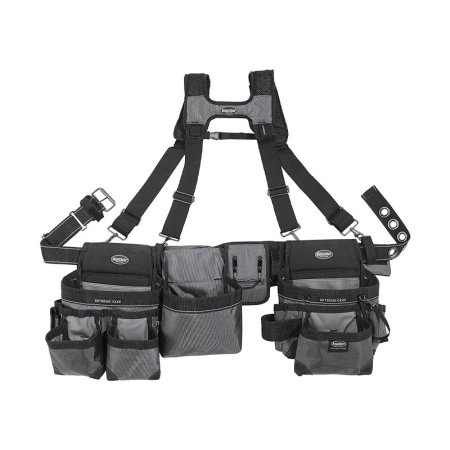
Pros
Cons
Product Specs
- Material: Heavy-duty 1680D poly fabric
- Pockets/pouches: 29
- Waist adjustment: Up to 52”
Carry all the necessary tools with this tool belt from Bucket Boss, which boasts 29 pockets with numerous large- and medium-size pouches, which is more than most framers’ rigs.
It features three large pockets, each with enough space to carry a framer’s square, a box of drill bits, a screwdriver, a set of pliers, and other hand tools. Its medium-size pockets provide room for tape measures, plumb bobs, and boxes of nails or screws. All pockets are barrel-bottomed for maximum capacity.
Having room for so much gear wouldn’t make much difference if this belt didn’t fit snug and secure. Thick padding on the shoulder straps and inside the belt provides plenty of cushioning for comfort.
Large metal grommets on the belt with a steel slide buckle allow for easy belt adjustments to achieve a snug fit around the hips. This tool belt fits waist sizes up to 52 inches.
Best with Suspension Rig
Milwaukee General Contractor Work Belt
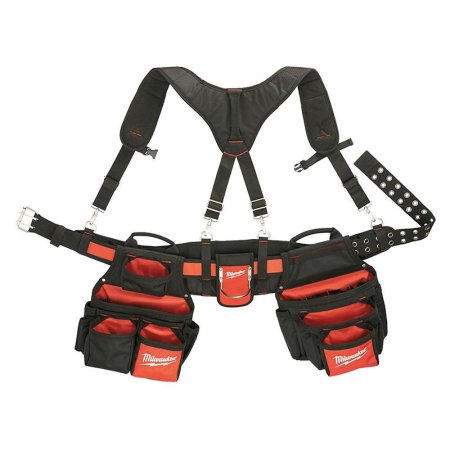
Pros
Cons
Product Specs
- Material: Heavy-duty 1680D nylon
- Pockets/pouches: 24
- Waist adjustment: 30 inches to 53 inches
For tool belt suspenders to be effective, they have to be tough, supportive, easy to adjust, and durable. Milwaukee’s heavy-duty unit checks all these boxes, with tough 1680D nylon (providing high durability without excessive weight) and all-metal hardware. Breathable material provides all-day comfort. A useful smartphone pocket in the front offers added convenience.
The broad belt comes with numerous versatile, easy-to-reposition pockets that allow for carrying all kinds of tools, fasteners, and accessories. One has a puncture-resistant lining specifically designed for nails or other sharp objects. Although, a few pockets run a little small.
Best Tool Belt Set
ToughBuilt Handyman Tool Belt Set

Pros
Cons
Product Specs
- Material: Polyester
- Pockets/pouches: 27
- Waist adjustment: 32 inches to 48 inches
Made of six-layered, super-rugged nylon, this versatile belt keeps up with the pros. Although the product specs say two pockets, each contains many compartments. It features loops, clips, zippers and a total of 27 pouches, plus the two multi-pocketed tool holders clip to the front or the sides of the padded belt as needed.
An integrated “kickstand” keeps the tool pouches upright when not hanging around a waistline. Primarily designed for framers, the belt suits a variety of job site trades and enthusiastic DIY remodelers, and it adjusts to fit waists from 32 to 48 inches.
Our Verdict
As you would expect from the brand, the DeWalt tool belt offers a tough and versatile tool belt for the professional or serious DIY user. The Dickies tool belt, another respected manufacturer, is just right for small tasks at home or on the job site.
How We Chose the Best Tool Belts
The following criteria resulted from in-depth research and actual hands-on experience with tool belts during extensive remodeling projects.
Comfort. It doesn’t matter whether a tool belt carries five tools or 50; if it isn’t reasonably comfortable, it won’t serve its purpose. That’s not to say all tool belts offer equal comfort, but they need to provide a level of comfort appropriate to their design.
Capacity. Some people need a belt that will hold just four or five tools. Some might need to carry a dozen or more. To ensure we offered choice for all kinds of users, we included a wide range of capacities.
Durability and value. DIYers and pros seldom look after their tool belts, so good construction and quality matter. At the same time, cost matters, too. Our broad selection offers quality pieces for all budgets.
FAQs
The information above provides plenty of insight into how to choose the best tool belts for a number of different tasks. During our research we found a number of questions that crop up relatively frequently, so we have provided answers for those below.
Q: Is wearing a tool belt bad for your back?
Carrying a lot of heavy tools on a belt can cause back pain, yes. Try not to overload. Check the contents of the belt so you are only carrying essentials. Consider a suspender to spread the load over the whole upper body.
Q: How do you wear a tool belt?
Usually they are worn on the hips, where the belt for your pants would normally sit. Most people wear them with the pockets on the front. However, if you need to bend forward often, this can get in the way. Many belts allow you to reverse the pockets so they are on the back.
Q: What should I carry in my tool belt?
It will depend on the task. Things like pliers, a utility knife, a pencil, a tape measure, screwdrivers, and a hammer are common. If working on a ladder, think about the things that you’ll use most often and can carry safely.
Q: How do I organize my tool belt?
Much of it has to do with personal preference, but most people keep the tools they use most often on their dominant side. Longer tools like hammers should be at the side where you won’t bang them with your knees. Try to spread the weight around where practical.
Q: What is the most comfortable tool belt?
All of our top picks offer good adjustment, but suspenders offer maximum support, so we would recommend either the DeWalt Framer’s Combo.

